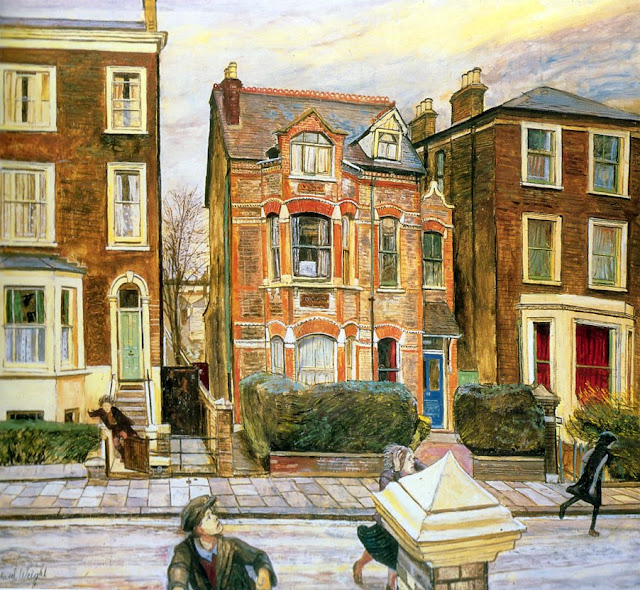Carel Victor Morlais Weight (10 September 1908 – 13 August 1997) was an English painter.Weight was born in Paddington in 1908. His father was a bank worker and his mother, who was of Swedish and German descent, was a chiropodist.[3] He studied at the Hammersmith School of Art from 1928 to 1930. At Hammersmith he met Ruskin Spear, who became a life-long friend. At Goldsmiths College, between 1931 and 1933, Weight developed his preference for imaginative compositions. Teaching at the Beckenham School of Art allowed Weight to support himself throughout the 1930s. His first solo exhibition was held in the Cooling Gallery in 1933 and he later exhibited in some major London galleries and throughout the United Kingdom.
During the Second World War, Weight served with the Royal Engineers and the Army Education Corps. As an Official War Artist in 1945, he worked in Austria, Greece and Italy. Weight wrote to the War Artists' Advisory Committee, WAAC, in December 1939 seeking work as a war artist. A number of commissions were discussed and eventually, in March 1942, WAAC purchased one picture from Weight. By then he had been called up and his time for painting was restricted.In July 1942 Weight's painting of a zebra that escaped from London Zoo during an air raid was purchased, but his commanding officer would not release him for further WAAC commissions. It was not until the spring of 1945, after Albert Richards had been killed, that WAAC could offer Weight a full-time post. Weight landed in Naples in March 1945 and travelled to Rome, Perugia, Verona, Florence and reached Ravenna in October that year. During November and December 1945 Weight visited Vienna, Rome and Florence and arrived in Athens in February 1946.In Greece and Italy he depicted the immediate aftermath of the War and the role of the British Army in working to restore civil society after the conflict.
In 1947, Weight began teaching at the Royal College of Art, and was professor of painting there from 1957.He retired in 1973. He was elected to the Royal Academy in April 1965, and senior R.A. in 1984.
Many of his paintings showed suburban settings in which unexpected human dramas occurred, some of them humorous and some frightening. Each painting's location was chosen specifically for its abstract structure; the locations were usually actual places, but the figures were imagined and "gr[e]w under the brush".Weight wrote that his art was "concerned with such things as anger, love, hate, fear and loneliness", and said, "for me the acid test of a painting is: will the ordinary chap get anything out of this?"He was prolific, and typically painted 50 paintings in a year.
Weight was an instructor, mentor and good friend to John Bratby and Jean Cooke.
Weight died on 13 August 1997 at the age of 88. Works by Weight are owned by the Tate Gallery, the Victoria and Albert Museum, the Imperial War Museum and feature in the United Kingdom Government Art Collection.Wikipedia
Many of his paintings showed suburban settings in which unexpected human dramas occurred, some of them humorous and some frightening. Each painting's location was chosen specifically for its abstract structure; the locations were usually actual places, but the figures were imagined and "gr[e]w under the brush".Weight wrote that his art was "concerned with such things as anger, love, hate, fear and loneliness", and said, "for me the acid test of a painting is: will the ordinary chap get anything out of this?"He was prolific, and typically painted 50 paintings in a year.
Weight was an instructor, mentor and good friend to John Bratby and Jean Cooke.
Weight died on 13 August 1997 at the age of 88. Works by Weight are owned by the Tate Gallery, the Victoria and Albert Museum, the Imperial War Museum and feature in the United Kingdom Government Art Collection.Wikipedia








